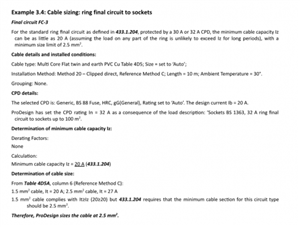I have also been trying to establish how Amtech calculates the grouping factors of ring circuits (with no luck), I have been changing the design current to see if I could see a trend but there doesn’t seem to be one. I have attached the table below to see if anyone else has any ideas on the calculation, there doesn’t seem to be anything within the manual.
| Design Current |
| Grouping Factor (2 circuits) |
| Iz |
| 20 |
| 0.8 |
| 21 |
| 21 |
| 0.8 |
| 21.1 |
| 22 |
| 0.8 |
| 21.2 |
| 23 |
| 0.8 |
| 21.3 |
| 24 |
| 0.8 |
| 21.5 |
| 25 |
| 0.8 |
| 21.6 |
| 26 |
| 0.8 |
| 21.7 |
| 27 |
| 0.8 |
| 21.8 |
| 28 |
| 0.8 |
| 22 |
| 29 |
| 0.8 |
| 22.7 |
| 30 |
| 0.8 |
| 23.4 |
| 31 |
| 0.8 |
| 24.2 |
| 32 |
| 0.8 |
| 25 |

